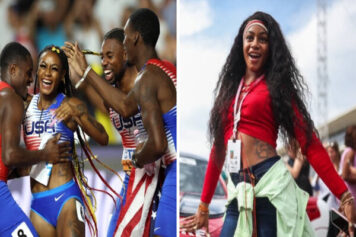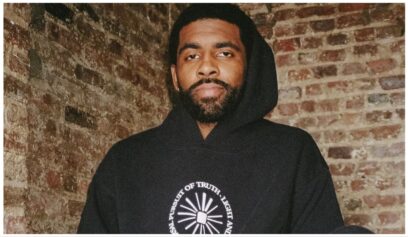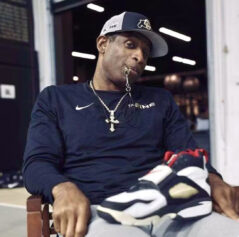On an extended MLK Jr weekend, Nike gathered 14 special Black youth leaders who have worked to affect change in their communities through sports to kick off its six-month mentorship program, Future Varsity.
Being special can be isolating. To be special means to be different than the status quo, and thusly, the people around you. And on an extended Martin Luther King Jr weekend, Nike gathered 14 special Black youth leaders who have worked to affect change in their communities through some connection with sports to kick off its six-month mentorship program, Future Varsity. For four days, these exceptional, young people existed in a space where their plight for change was the status quo.
For the six-month program, the youth leaders will be paired with Nike mentors and educational organizations, such as Triple Threat Mentoring, which led the activities during the four-day weekend and given help. Depending on scheduling, the prodigal talents will also be able to speak with Nike athletes, such as WNBA superstar Maya Moore, who spoke with the Future Varsity students during the four-day weekend. The four-time WNBA champion, who has been speaking out against prosecutorial misconduct in recent years, understood the obligation, as an athlete, to affect change, that these young people do.
“You never know what people are actually doing with their money and time,” Maya Moore told The Shadow League. “Some people who might not be as vocal can still have a gift at leading and inspiring people.”
The student body of Future Varsity is vast. There are teenagers who have been recognized by President Obama; kids from single-parent households who are keeping people off the streets through sports; and young Black women stepping proudly in spaces they rarely ever exist in.
The Shadow League traveled to Atlanta to see what happens when you get the architects of the future in the same room.
Run Black To You

Maiya Newton, 21 with Nike/WNBA’s Maya Moore
For Black people, simply existing in certain spaces is tantamount to revolution. 21-year-old Maiya Newton is a Georgia State University student who, as part of a team, developed award-winning software for the volleyball team to help coaches monitor its players’ jumping. As a frequent participant of hackathons, she has enough agency to recognize that her true help to the community is simply being a Black face where little boys and girls may never think to look for them.
“I know when I go to these hackathons there’s not going to be girls that look like me. The chances of seeing a young Black woman at a hackathon are slim to none. Just seeing someone there that looks like me is helping the community,” Newton told The Shadow League.
One Black girl once searching to see more people like her appeared by surprise to Future Varsity: a young Amandla Stenberg. On the second to last day of the extended weekend, The Hate U Give actress spoke on a Q + A panel at Atlanta members-only club The Gathering Spot. Time Magazine’s “voice of her generation” shared stories of her prepubescent search for representation to a crowd of her peers that have yearned for the same.“I remember being a little Black girl and watching TV or movies and seeking, desperately, a reflection of me. I felt I couldn’t always find it,” Stenberg told the attentive audience.

Actress, Amandla Stenberg
Throughout my time over the extended weekend with the mentees I caught numerous conversations between them discussing tips on grassroots organizing, laughter over the shared struggle of getting people to see their vision, and plans on collaborating in the future. They were speaking a language of change that may be foreign in their communities where they must teach their vision before it’s seen, sometimes, but can be spoken freely and fluently in Future Varsity, amongst like-minded people.
Class was also in session at Future Varsity over the weekend. There was an educational field trip through the National Center For Civil and Human Rights where the mentees could hear King’s speeches, feel what it was like being berated at sit-ins during the Civil Rights Movement, and gain a deeper connection with their history. They were also being taught a curriculum that included learning about developing a mission statement, emotional intelligence (EQ), as well as “behavioral assessments and leadership development more typically reserved for high-level executives or large corporations,” according to Triple Threat Mentoring President/CEO Caleb Luper.
Most people their age would have to grow up quick to handle the responsibilities of executive-level training. I soon learned Future Varsity students were wiser beyond their years.
The Age of The Hustle

McKinley Nelson, 21
Blackness has a way of maturing the young, quickly. Stenberg recalled the adult-like awareness she had to develop at the impressionable age of 12 after her being cast in The Hunger Games. People were going as far as claiming the importance of her character’s death wouldn’t matter as much because of the color of her skin. “Coming up against that at a young age made me really cognizant of how pervasive that kind of hatred and misunderstanding of us is and how important it is that we counterbalance it.”
McKinley Nelson, 21, from Chicago, Illinois knows all too well about the world making you grow up too soon. In August 2018, Nelson founded Project sWish aiming to keep Chicago youth out of trouble by keeping them on the basketball court. Not only did he see Chicago youth leave their childhood behind for an adult life of crime, but he also had to learn how to balance the invisible backpack of struggles and benefits his age places on him every day.
“When I’m talking to people, I’m usually friends with their kids, so they think, ‘Oh, my daughter’s friend is doing something. That’s cute,” Nelson remarked with a jokingly annoyed look on his face. “But, if I talk to somebody I’ve never met before it’s, ‘Oh, it’s this young dude trying to do something serious in the community. Let me hear what he has to say.”
A few months before the four-day weekend, Nike reached out to Geoff Berman, former deputy training director for Barack Obama’s 2008 and 2012 presidential campaigns. He taught the people that hit the streets to get Obama elected twice and shared those tips with Future Varsity. Before he gave the mentees advice on funding and how to turn ideas into actions, he explained to The Shadow League how they could circumvent ageism in their non-profit pursuits. “Maybe they need to partner with somebody who is more experienced and wise in the ways of finance. That way they have the stability of the experienced person and this young, passionate person working together.”
At Future Varsity, their age was an afterthought; their integrity was their identity. Nike had the mentees’ photographs placed on large blocks that read the “Until We All Win” slogan in close proximity to poster boards of LeBron James, Russell Westbrook, Serena Williams, and Kevin Durant brandishing the same photo quality and slogan. The young people were even featured in a video that had the same pristine quality as almost any Nike commercial. Just seeing themselves in the same room as Nike athletes seemed to motivate them to turn their dreams into action.
Actionable Dreams

Sharrod Golightly, 26
At the end of the weekend, the young people didn’t leave Atlanta with just inspiration. The next leaders left ready to make actionable change. “Making sure their dreams are actionable and they’re coming out of this weekend with the beginning of a plan over the next coming months to bring it closer to reality,” Berman said about his plans for speaking with the mentees.
Nearly all of the mentees at Future Varsity told me they already have plans. Nelson has plans for his own basketball league aimed to keep people out of crime. “The league I’m launching this Spring is in Chicago’s worst neighborhoods at the highest times of crime, to literally remove people off the streets and into the gyms,” Nelson proclaimed, vehemently. “Everybody grows up in Chicago playing basketball, we just get disconnected from it and hop into other things.”
Sharrod Golightly, 26, from East Atlanta, has a Black History Month program launching in February, will teach kids about superfoods and how to grow their own food in March, and another East Atlanta Field Day in April. There’s rallies planned and clothing drives in the works.
Future Varsity is a salient example of what happens when the future gets to decide the future together.



